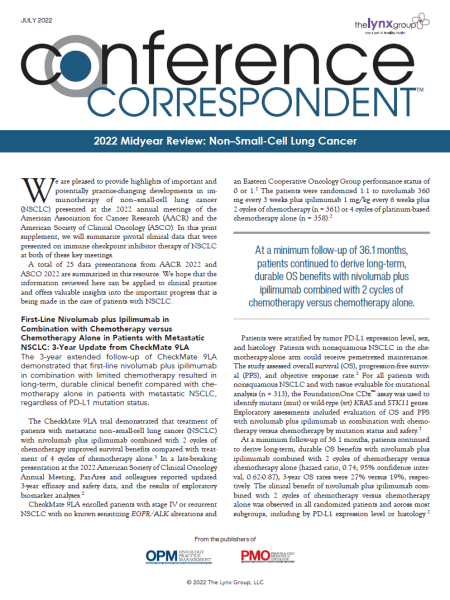Three-year survival rates from the PACIFIC study validate the long-term clinical benefit of durvalumab when used after chemoradiotherapy in stage III NSCLC.
In the phase 3 PACIFIC study, eligible patients had histologically and/or cytologically documented stage III unresectable NSCLC and a World Health Organization performance score of 0 or 1.1 Patients had to have received ≥2 cycles of platinum-based chemotherapy concurrently with definitive conformal radiation therapy (CRT) without progression. Their last radiation dose was administered 1 to 42 days before study randomization.1 Enrollment in the PACIFIC study was not restricted to any threshold levels for programmed cell death-ligand 1 expression.1 Patients were randomized to receive durvalumab (Imfinzi; 10 mg/kg intravenous) or placebo every 2 weeks for up to 12 months or until confirmed disease progression, initiation of alternative cancer therapy, unacceptable toxicity, or consent withdrawal.1
Initial results from the phase 3 PACIFIC study showed that durvalumab extended progression-free survival (hazard ratio [HR], 0.52; 95% confidence interval [CI], 0.42-0.65; P <.0001) and overall survival (OS; HR, 0.68; 95% CI, 0.53-0.87; P = .0025), with no new safety signals after additional follow-up.1 These results led to the approval of durvalumab for patients with unresectable stage III NSCLC who had not progressed while undergoing CRT. Use of the PACIFIC regimen, CRT followed by durvalumab, has become the new standard of care in this setting.2
In 2020, researchers reported 3-year OS rates for all patients randomized in the PACIFIC study.2 OS was analyzed by using a stratified log-rank test in the intention-to-treat population. Medians and rates at 12, 24, and 36 months were estimated by the Kaplan-Meier method.2
As of January 31, 2019, 48% of patients had died (44% and 57% in the durvalumab and placebo groups, respectively).2 The median duration of follow-up was 33 months.2 Updated OS data remained consistent with the data previously reported.2 The stratified HR was 0.69 (95% CI, 0.55-0.86) and median OS was not reached for durvalumab compared with 29.1 months for placebo.2 The 12-, 24-, and 36-month OS rates with durvalumab and placebo were 83% versus 75%, 66% versus 55%, and 57% versus 44%, respectively.2 All secondary outcomes examined showed improvements consistent with previous analyses of the PACIFIC trial.2
Researchers concluded that updated OS data from the PACIFIC study, including 3-year survival rates, demonstrate the long-term clinical benefit with durvalumab after chemoradiotherapy.2 These findings further establish the PACIFIC regimen as the standard of care in this population.2
References
1. Antonia SJ, Villegas A, Daniel D, et al; for the PACIFIC Investigators. Overall survival with durvalumab after chemoradiotherapy in stage III NSCLC. N Engl J Med. 2018;379:2342-2350.
2. Gray JE, Villegas A, Daniel D, et al. Three-year overall survival with durvalumab after chemoradiotherapy in stage III NSCLC—update from PACIFIC. J Thorac Oncol. 2020;15:288-293.

